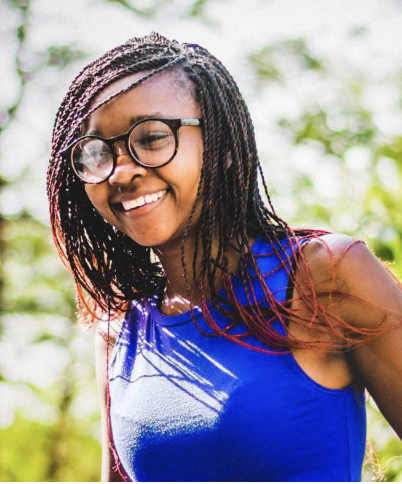July 26, 2022
This is a personal essay by Joyce Ouma , an HIV advocate in Kenya.

Joyce Ouma , an HIV advocate in Kenya.
In 2014, during my final year of high school, I developed painful red welts all over my body. I didn’t know then that the rash was shingles, which can be a sign of HIV. When I arrived at the hospital, the doctors took one look at me and ordered an HIV test. I remember the exact day and time when the results came back positive: July 1 at 1:30pm. I was 17 and in total shock.
Up until that point, I had not given HIV much thought, though of course I knew it had ravaged my country, Kenya, and much of Africa, in the 1990s and early 2000s. But so much progress had been made since then, and the crisis seemed long ago to me. I was just a teenage girl, focused on my friends and my studies. But I knew that everyone in my life – my friends, family, classmates and my boarding school – would make assumptions about how I had gotten the disease because of my age and gender. The assumptions were wrong, but I was terrified of the repercussions.
Since I couldn’t control what other people thought, and I still didn’t know how I’d contracted HIV, it seemed safer to keep my status a secret for as long as I could. The hospital, however, was obligated to tell my boarding school, and they added the words “HIV positive” to the first page of my file.
In the eyes of many around me, that’s all I could ever be. The swirl of stigma, confusion, and shame was overpowering. For a while, I stopped going to classes. I thought I would die.
In sub-Saharan Africa, young women between the ages of 15 and 24 are twice as likely as their male counterparts to be living with HIV, due in large part to gender inequalities and discrimination. Every week, 5,000 young women become infected with the disease. The numbers are jarring – even shocking – but the scale of this problem demands thinking beyond the data.
As a report by The Global Fund to Fight AIDS, Tuberculosis and Malaria and the World Health Organization makes clear, stigma and discrimination can and do deter people from accessing life-saving care. Unless we increase investments in fighting stigma and providing long-term psychosocial support for people living with HIV – especially adolescent girls and young women and others in vulnerable groups — we won’t end this epidemic and more people will needlessly lose their lives.
Unfortunately, I’ve seen a version of this scenario play out up close. Before I graduated from high school, I met another classmate living with HIV. We would go to the clinic together to collect our medications. Each of us knew what the other was experiencing, and together, neither of us felt alone. I didn’t understand how important this was until I graduated from boarding school and moved to a different area. My friend had to go to the clinic by herself. The stigma and lack of support were too much for her to overcome. She stopped going to collect her medications, and she died.
For a long time, I was consumed with a bitterness and guilt that felt bottomless. How could this have happened? We both had access to free antiretrovirals – why was I still alive, but not her?
I thought about how, in the darkest months after my diagnosis, I told a few close friends about my diagnosis. When the shingles spread all over my body, they washed me in a special soap and made sure the bath water was at exactly the right temperature. They defended me from bullies when my status became more widely known at our boarding school. They stood by me when I needed it most. I’m not sure I would have survived without them.
I thought about the support I later received at a clinic in Nairobi – two hours away from where I live – and how a kind doctor sent me money for transportation costs when I couldn’t afford it. I thought about how this same clinic made sure I had enough to eat and checked in with me about how I was feeling. In many ways, my experience was happenstance. I was, despite the devastating circumstances, lucky.
I decided to go public with my status because I want to make things better for others in my situation. It shouldn’t come down to luck. My life’s work now focuses on fighting stigma and making patient-centered care and long-term psychosocial support the norm, especially for other young women living with HIV.
Slowly, I’m seeing the conversation shift about ending the HIV epidemic. We can and must take a more holistic approach, but that requires new thinking, new systems and amped up funding.
The Global Fund has called on world leaders to pledge $18 billion over the next three years to get the fight against AIDS, TB and malaria back on track after devastating impacts from COVID-19. This fall, those same world leaders will gather in New York for the official Global Fund fundraising conference. I urge them to consider how their investments can be transformative, not just in the currency of life-saving medications, but also in creating life-saving systems of prevention and support. This is how we will end the HIV epidemic once and for all.
Joyce Ouma is an HIV advocate in Kenya. She is a member of the Communities Delegation to the Board of the Global Fund to Fight AIDS, Tuberculosis and Malaria and she represents young people on Kenya’s Country Coordinating Mechanism.
